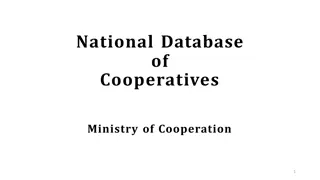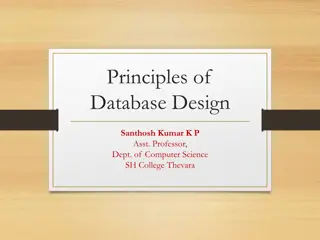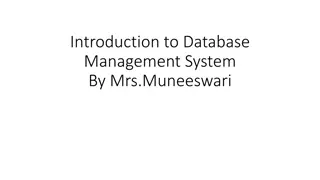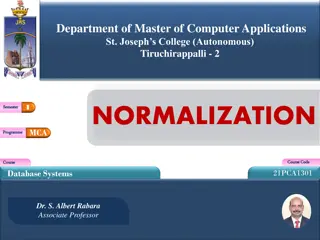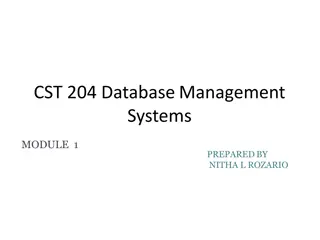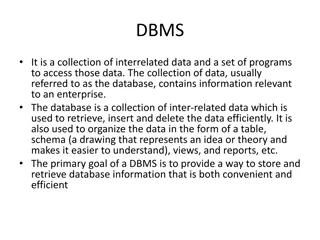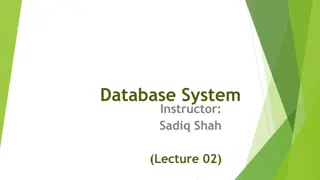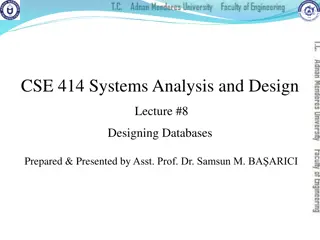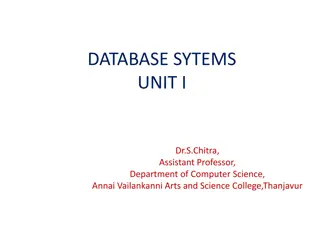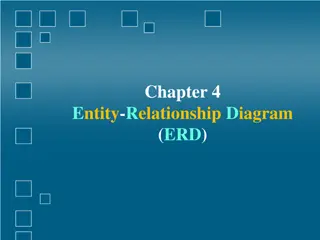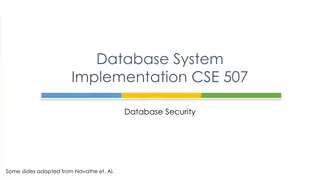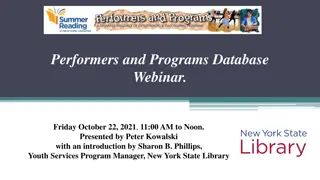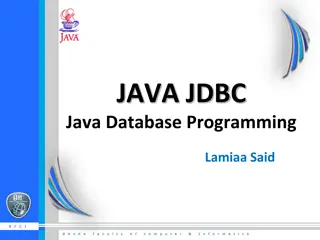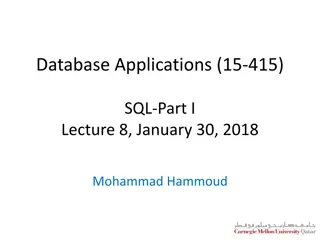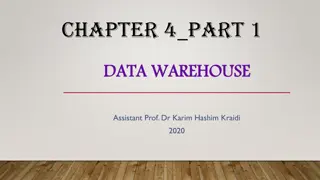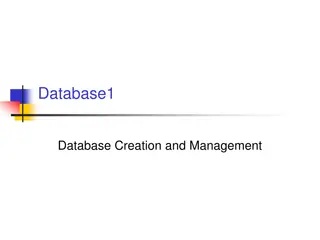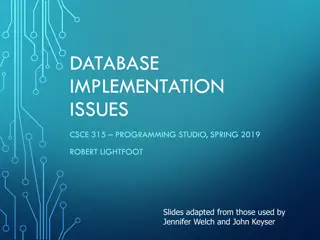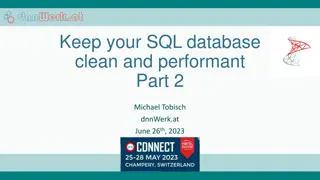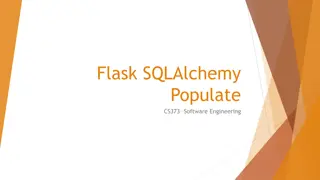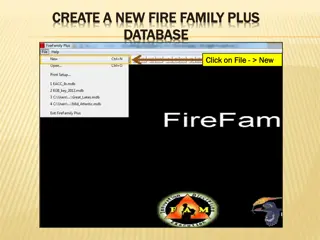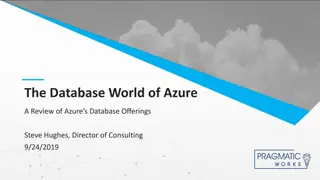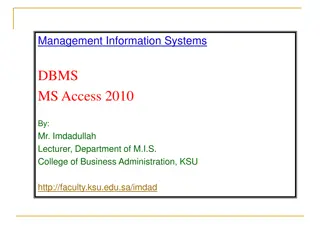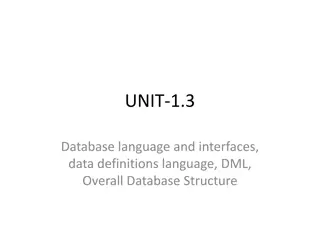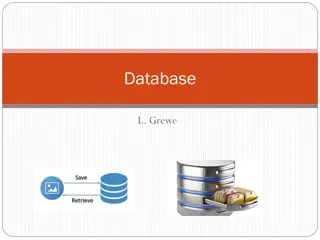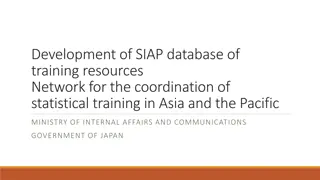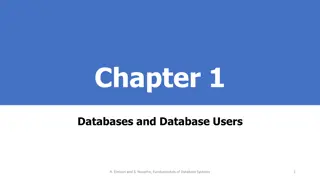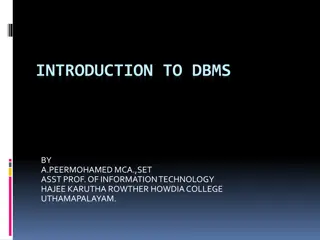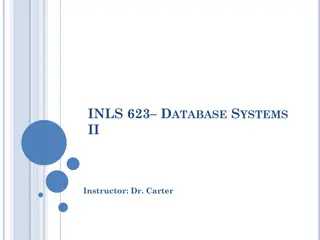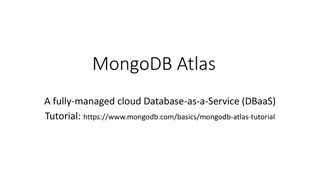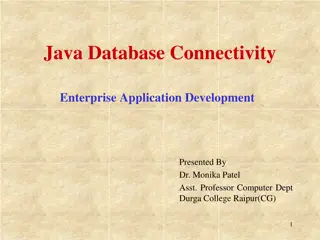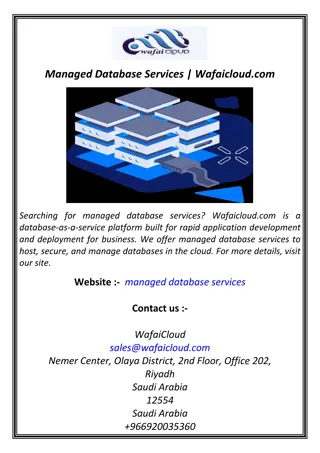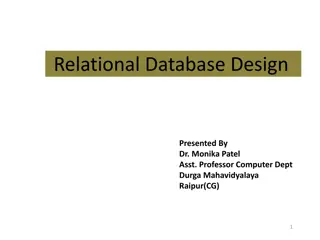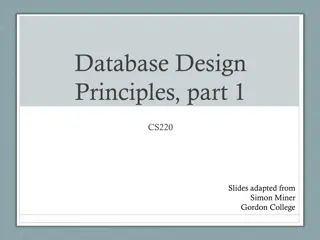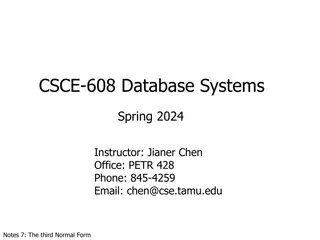National Database of Cooperatives: Ministry of Cooperation Initiatives
The Ministry of Cooperation is developing a National Database of Cooperatives to enhance transparency, governance, and policymaking in the cooperative sector. The database aims to provide comprehensive information on cooperatives across sectors, improve coordination among stakeholders, and facilitat
0 views • 22 slides
Database Design Principles and Management Overview
This document presents an overview of database design principles, including structured, semi-structured, and unstructured data types. It delves into the role of Database Management Systems (DBMS) in defining, constructing, manipulating, and sharing databases effectively. It also covers various types
0 views • 47 slides
Introduction to Database Management System Explained
This presentation covers the basics of database management systems, including definitions of data, types of data, structured and unstructured data, storing data in computers using file systems and database systems, and issues with file systems like data redundancy, inconsistency, difficult data acce
3 views • 18 slides
Database Normalization and Functional Dependencies
Database normalization is a crucial process that aims to improve database design by organizing data into higher forms of normality. This helps in reducing redundancy and ensuring data integrity. Functional dependencies play a key role in defining relationships between attributes in a database. By un
1 views • 33 slides
Introduction to Database Management Systems
Understanding the fundamentals of Database Management Systems (DBMS), including data models, schema architecture, entity-relationship models, and the role of DBMS in storing, manipulating, and analyzing data efficiently. Explore the significance of database systems in managing information and ensuri
1 views • 132 slides
Oracle 19c Standard Edition: RAC Migration and Database Solutions Overview
Explore the implications of Oracle Database 19c Standard Edition no longer supporting RAC, and learn about disaster recovery and high availability options for users. Delve into the differences between HA and DR, along with the significance of workload isolation and scalability in database management
4 views • 22 slides
Database Management Systems (DBMS)
A Database Management System (DBMS) is a crucial tool for organizing, storing, and managing data efficiently. It allows users to create, update, retrieve, and delete data effectively, ensuring data consistency and security. DBMS software like MySQL and Oracle provide interfaces for various database
2 views • 21 slides
Costs and Risks of Implementing a Database Approach
Implementing a database approach involves additional costs and risks that need to be managed effectively. From hiring specialized personnel to dealing with conversion costs and organizational conflicts, organizations must carefully consider the implications of transitioning to a database system. The
2 views • 10 slides
Database Design Process and Concepts
This lecture on designing databases covers the database design process, normalization, transforming E-R diagrams, physical database design concepts, and steps in logical database modeling. It highlights the importance of logical and physical database design in system development, providing insights
1 views • 64 slides
Entity-Relationship Model in Database Systems
This article explores the Entity-Relationship (ER) model in database systems, covering topics like database design, ER model components, entities, attributes, key attributes, composite attributes, and multivalued attributes. The ER model provides a high-level data model to define data elements and r
1 views • 25 slides
Database Systems in IT
Database systems play a crucial role in managing and organizing data efficiently. They provide a structured environment for storing and accessing information, enabling various applications in sectors like banking, airlines, universities, sales, and more. The transition from traditional file systems
3 views • 38 slides
Entity-Relationship Diagrams (ERD) for Database Design
Entity-Relationship Diagrams (ERD) are vital in database design, illustrating entities and their relationships. They help in conceptualizing data models and laying the groundwork for database structures. The process involves identifying entities, defining relationships, and analyzing interactions to
1 views • 40 slides
Database Security Measures and Controls
Database security is crucial to protect against threats like loss of integrity, availability, and confidentiality. Countermeasures such as access control, inference control, flow control, and encryption are important for safeguarding databases. Access control involves creating user accounts and pass
1 views • 35 slides
Performers and Programs Database Webinar - Overview and Features
Learn about the Performers and Programs Database Webinar happening on October 22, 2021. This webinar, presented by Peter Kowalski and introduced by Sharon B. Phillips, offers valuable information about the database's features, including how performers advertise programs, categorization, virtual prog
1 views • 25 slides
Introduction to Database Systems and SQL Programming
Understanding database systems is crucial in today's digital world. Explore the basics of database systems, SQL statements, and Java Database Connectivity (JDBC) in this comprehensive overview. Learn about DBMS, SQL querying, JDBC API, and more to enhance your understanding of managing and interacti
10 views • 24 slides
SQL: Major Aspects and Functionality in Database Applications
SQL, as a relational database language, offers Data Manipulation Language (DML) and Data Definition Language (DDL) for querying and modifying data. Additionally, SQL encompasses triggers, embedded code execution, remote database access, transaction management, and security features for efficient dat
1 views • 52 slides
Overview of Database Systems Architecture and Languages
A database system is essential for storing and managing an organization's data. The architecture includes components like file manager, database manager, and query processor. Additionally, DML and DDL compilers play crucial roles in handling data manipulation and definition tasks. Various data struc
2 views • 28 slides
Contrasting Operational Database Systems and Data Warehouses: Key Variances Explained
Understanding the disparities between operational database systems (OLTP) and data warehouses (OLAP) is crucial. OLTP systems focus on transaction processing for daily operations, while OLAP systems cater to data analysis and decision-making needs. Variances include user orientation, data content, d
1 views • 12 slides
Database Management Systems and Concepts
Explore the world of databases with topics ranging from Database Creation and Management to Basic Database Terms. Learn about the significance of data, information, and metadata in decision-making processes. Discover the purpose of database systems and the role of Database Management Systems (DBMS)
2 views • 25 slides
Database Implementation Issues in Programming Studio
Key topics covered in the slides include database implementation issues, storing data efficiently, and strategies for handling variable length fields in tuple storage. The presentation delves into specialized algorithms for database efficiency and reliability, terminology related to database impleme
0 views • 32 slides
Efficient SQL Database Maintenance for Performance
Learn to effectively clean and optimize your SQL database for optimal performance. Discover tools like Ola Hallengren's Maintenance Solution and Brent Ozar's First Responder Kit, along with best practices for backup, restore, index optimization, and database integrity checks. Ensure a healthy databa
0 views • 17 slides
Flask-SQLAlchemy for Efficient Database Management
Flask-SQLAlchemy, a powerful tool for database management in Python, offers a seamless way to interact with databases using object-oriented concepts. By integrating SQLAlchemy's ORM capabilities with Flask, developers can simplify database operations and enhance productivity. This article provides a
1 views • 15 slides
Guide to Importing and Organizing Station Catalogs and Weather Data
This guide provides step-by-step instructions on how to create a new database for fire-related data, name the database, save it in a specific folder, open the database, and import station catalogs and weather data. The process involves creating a fire family plus database, naming and saving it prope
0 views • 18 slides
Database Basics for ASP.NET Development
Explore the fundamentals of databases, SQL usage, database relationships, and available tools for managing database objects in ASP.NET projects. Learn about relational databases, popular database options like Microsoft SQL Server, and setting up SQL Express for local development.
1 views • 27 slides
The World of Azure Database Offerings
Exploring Azure's database offerings including Azure Cosmos DB and Azure SQL Database. Azure Cosmos DB provides a globally scalable document database solution, while Azure SQL Database is a great option for SQL Server workloads. Both platforms offer unique features such as low latency, scalability,
1 views • 15 slides
MS Access 2010: Database Management Essentials
Explore the fundamentals of MS Access 2010, a powerful application software that enables the creation of Database Management Systems. Learn key terminologies, database creation steps, table design procedures, and primary key creation methods from this comprehensive guide by Mr. Imdadullah, a Lecture
0 views • 35 slides
Entity Framework in C# for Database Management
Entity Framework in C# offers a powerful ORM solution for data manipulation and database management. It allows developers to work with databases in an object-oriented manner, simplifying the handling of database operations. Learn about ORM, Code First approach, conventions, DbContext usage, and data
1 views • 21 slides
Tcl Package for SQLite3 Database Schema Migration
A Tcl package was developed to support schema migration in SQLite3 databases, enabling incremental or reversal changes to relational database schemas. The package includes functions for fundamental database operations like table creation, deletion, column addition, removal, and table renaming. By ge
0 views • 15 slides
Database Language and Interfaces Overview
A database management system (DBMS) requires appropriate languages and interfaces to handle queries and updates for data manipulation and control. This includes Data Definition Language (DDL), Data Manipulation Language (DML), Data Control Language (DCL), and Transaction Control Language (TCL). Each
1 views • 12 slides
Database Management Systems and Data Storage
Explore the world of Database Management Systems (DBMS) and learn about the evolution of data storage from flat-file to relational databases. Discover the key features of a DBMS, different database types, administration tools, SQL and NoSQL databases, CAP theory, and considerations for choosing betw
1 views • 32 slides
Development of Statistical Training Resource Database for Asia-Pacific by SIAP
Development of the SIAP database aims to coordinate statistical training resources in Asia and the Pacific. The database includes information on training courses, experts, materials, and schedules, facilitating data input and sharing for organizations and institutions. The database launch schedule a
0 views • 5 slides
Overview of Databases and Recent Developments in Database Systems
Explore the fundamentals of databases, including types, applications, users, and advantages. Learn about traditional and recent database applications, such as social networks, search engines, and emerging technologies like Big Data systems and NOSQL. Understand the concept of databases as a collecti
2 views • 30 slides
Database Management Systems (DBMS): A Comprehensive Overview
This comprehensive overview of Database Management Systems (DBMS) covers the definition, environment, advantages, limitations, and characteristics of data in a database. It delves into the hardware and software components, user roles, and benefits of using a DBMS. The content highlights the control
1 views • 25 slides
Relational Database Management Systems
Dive into the world of database systems with a focus on relational structures, entities, properties, and relationships. Explore the types of database systems, the representation of entities in tables, and the constraints and types of relationships that govern data connectivity. Gain insights into or
0 views • 17 slides
Getting Started with MongoDB Atlas - Fully Managed Cloud Database Service Tutorial
Explore MongoDB Atlas, a fully-managed cloud Database-as-a-Service (DBaaS) that simplifies database management. Learn how to create databases, collections, users, and documents within a MongoDB cluster. Get step-by-step guidance on setting up your free MongoDB Atlas account and managing your databas
0 views • 32 slides
Introduction to Java Database Connectivity (JDBC) in Enterprise Application Development
JDBC, or Java Database Connectivity, is a vital technology in enterprise application development that provides a standardized library for Java programs to connect to databases via SQL commands. It abstracts vendor-specific details, making connectivity to multiple databases seamless. JDBC API standar
1 views • 13 slides
Managed Database Services | Wafaicloud.com
Searching for managed database services? Wafaicloud.com is a database-as-a-service platform built for rapid application development and deployment for business. We offer managed database services to host, secure, and manage databases in the cloud. Fo
3 views • 1 slides
Relational Database Design Fundamentals
This content delves into the crucial aspects of relational database design, including normalization, pitfalls, RDBMS design issues, and the overall database design process. It emphasizes the need for well-structured relation schemas to minimize redundancy, ensure data integrity, and facilitate effic
1 views • 53 slides
Database Design Principles Overview
Explore the fundamental concepts of designing a database, covering topics such as decomposition, functional dependencies, closures, and canonical cover. Understand the importance of avoiding redundancies and anomalies in database design while striving for lossless-join and dependency-preserving deco
0 views • 35 slides
Database Normalization and BCNF in Database Systems
Learn about the process of database development, including E-R diagrams, converting to relations, developing database operations, normalization, and BCNF. Explore algorithms for achieving BCNF and example scenarios to understand key concepts in database systems.
0 views • 43 slides
